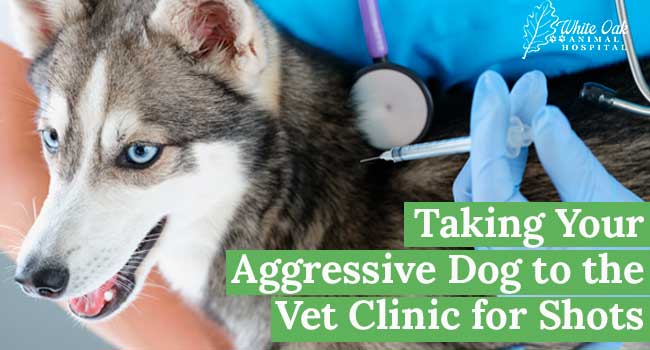
This article delves into the pivotal significance of vaccinations for dogs and the unique challenges that pet owners with aggressive dogs encounter during these necessary vet visits. When you have an aggressive dog, the term “vet visit” can evoke safety concerns for you, the veterinary staff, and your furry friend.
In the realm of responsible pet ownership, vaccinations stand as a cornerstone of canine health. While we recommend vaccines on a case-by-case basis, in general, these shots are not just preventive measures. They are vital shields against a plethora of potentially life-threatening diseases. However, the journey to vaccinate a dog is not always straightforward, especially when dealing with an aggressive canine companion.
By understanding these challenges and taking proactive measures, you can effectively manage the process of taking your aggressive dog to the vet clinic for shots. This ensures the safety and security of both your beloved aggressive dog and the dedicated veterinary team entrusted with their care. This collaborative effort fosters an environment where vaccinations can be administered effectively and without undue stress, ultimately safeguarding your dog’s health and the health of your community.
3 Common Misconceptions: Taking Your Aggressive Dog to the Vet Clinic for Shots
Aggression Is Always a Sign of Danger
Aggressive Dogs Cannot Be Vaccinated Safely
Aggressive Dogs Will Never Improve
How Misconceptions Affect Pet Owners’ Decisions
Fear-Based Decision-Making
By avoiding necessary vet visits, aggressive dogs miss out on crucial vaccinations and exams that protect them from potentially life-threatening diseases. Addressing these fears through education and understanding can lead to more informed and responsible choices when taking your aggressive dog to the vet clinic for shots, ultimately benefiting the well-being of all involved.
Delayed Vaccination Schedules
When taking your aggressive dog to the vet clinic for shots, misconceptions can lead to postponing vital vaccinations and annual care exams. Fear-driven decisions rooted in the misconception that aggression will inherently lead to danger can result in delayed or skipped vaccinations. However, this delay doesn’t resolve the issue but prolongs it. Aggressive dogs missing vaccinations remain vulnerable to preventable diseases. It’s essential to address these misconceptions through education and professional guidance for responsible pet ownership.
Potential Risks Associated with Taking an Aggressive Dog to the Vet Clinic
Safety Concerns
Stress and Anxiety
Taking your aggressive dog to the vet clinic for shots can be a stressful experience for both your pet and the veterinary staff. Vet visits can take an emotional toll on aggressive dogs. The unfamiliar environment, medical procedures, and interactions with unfamiliar people and animals can heighten their stress and anxiety. Strategies for reducing these negative emotions in aggressive dogs are vital. Veterinarians can employ techniques like low-stress handling and consider sedation when necessary to minimize stress during examinations and vaccinations.
Mitigating Misconceptions and Ensuring Safe Vet Visits
Veterinarians play a pivotal role in educating pet owners about aggression in dogs. They can provide resources and guidance for understanding and managing aggressive behavior. By fostering education and awareness, misconceptions can be mitigated, and pet owners can make informed decisions when taking their aggressive dogs to the vet clinic for shots. This collaborative approach ensures that both the dog’s health and the safety of everyone involved are prioritized. Veterinarians are valuable sources of knowledge when it comes to handling aggressive behavior in dogs. They can offer guidance and resources to help pet owners understand and manage aggression effectively.
When it comes to taking your aggressive dog to the vet clinic for shots, it’s crucial to address potential risks and misconceptions. Safety concerns for both veterinary staff and the dog itself need careful consideration, emphasizing the importance of a controlled and cautious approach during examinations and vaccinations. Furthermore, the emotional toll on aggressive dogs during vet visits, characterized by heightened stress and anxiety, should not be underestimated.
Strategies such as low-stress handling and, when necessary, sedation can play a pivotal role in minimizing these negative emotions and ensuring a safer environment for everyone involved when taking your aggressive dog to the vet clinic for shots. Strategies like low-stress handling and, when necessary, sedation can play a pivotal role in minimizing these negative emotions and ensuring a safer environment for everyone involved. While misconceptions can be daunting, seeking professional guidance and understanding that aggression doesn’t always equate to danger are essential steps.